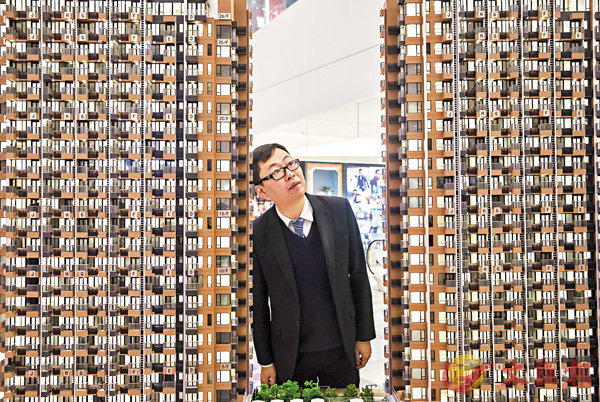 ■差餉物業估價署早前公佈,本港私樓售價連升25個月。 資料圖片
■差餉物業估價署早前公佈,本港私樓售價連升25個月。 資料圖片【原文】社聯發佈每兩年的研究數據,反映本港社會各領域的發展狀況,整體的社會發展指數為205,是數據發佈18年來首次錄得倒退,反映即使經濟發展強勁,社會發展仍然停滯,基層市民無法分享發展成果。
研究指出,指數下跌主要受房屋問題拖累,房屋指數錄得-342,兩年間大跌超過四成,顯示居住問題已經嚴重拖累社會發展和市民幸福感。
面對樓價迭見新高,資產價格與市民可支配收入的差距越拉越大,公營和資助房屋已經成為相當一部分市民保持居住質素的唯一希望。在房屋政策的大思路上,當局要利用豐厚的土地收入來幫助低收入和夾心階層改善居住質素。政府在加快覓地的同時,更有必要全面檢討房屋政策,積極研究資助房屋價格與市價脫鈎等問題。
輪候公屋達5.1年
雖然本港第一季度經濟增長4.7%,達到近7年高位,但經濟增長並沒有令基層市民感受到生活質素的提升,其中的關鍵在於居住問題。
社聯的研究指出,居住開支佔住戶總開支的百分比,2016年達到35.8%,較之兩年前的32.8%上升了3個百分點,反映市民需要縮減其他開支來應付居住需要;與此同時,相當部分市民的人均居住面積有越來越小的趨勢。
隨着近年樓價指數和租金指數迭創新高,相關情況相信只會日趨嚴重。而基層市民想輪候公屋,最新數據反映輪候時間突破紀錄,攀升至5.1年。各種數據都顯示居住問題已經成為影響市民生活質素的最大難題。
不論何種社會制度,居住是市民的基本需求。解決相當部分市民越住越細、越住越貴、入住公屋越來越難的問題,當局責無旁貸。
綜觀目前情況,除了加快覓地建屋外,政府還需要從兩方面着手,檢討優化房屋政策。
樓價飛升 市民受害
首先,房屋政策的大思路需要檢討。房屋兼有投資與居住兩個功能,私樓價格不斷上升,是因為市場資金豐沛,將私樓的投資功能不斷強化,令樓價高處未算高,從而與普通市民需要的居住功能越來越背離。
私樓價格不斷攀升,地王不斷出現,賣地和稅收令庫房收入大增,私樓投資者和政府都是「贏家」;但從居住功能的角度看,普通市民就是「受害者」。
因此,政府作為各種社會資源的調配者,應該將私樓市場的大量庫房收入,用於幫助市民改善居住。
其次,要全面檢討現行公營房屋和資助房屋制度,以豐厚的私樓市場收入解決基層市民和夾心階層的居住問題。
一方面增加公屋投放,滿足基層市民居住所需;另一方面,積極研究居屋、首置上車盤等資助房屋與私人樓價脫鈎,弱化資助房屋的投資功能,重燃市民以居住為主要目的的置業希望,讓大量無能力購買私樓的市民能有安居樂業的最重要保障。 (標題及小標題為編輯所加) (摘錄自香港文匯報社評24-05-2018)
How to Solve Hong Kong's Housing Shortage?
【譯文】The Social Development Index, a biennial study by the Hong Kong Council of Social Service(HKCSS)that aims to record the progress of social development, has recorded the first downturn since 2000 with a score of 205. It indicates a stagnating social development - the poor did not benefit from growth despite the fact that the economy is flourishing.
Housing prices are out of control
According to the study, the fall in the index is largely due to housing shortage, as the housing sub-index dived by over 40 per cent to minus 342 within two years. It shows that housing problems have severely hampered both the city's progress and the citizen's life satisfaction.
As the affordability of homes shrinks amid soaring property prices, many can only set their hopes on public and subsidised housing if they want to maintain the quality of their living environment. When devising the long term housing strategy, the government should make use of its hefty land revenue to help the low-income group and the sandwich class improve the quality of their living environment.
Apart from ramping up efforts to seek new sources of land, the government must also review the existing housing policies and study the decoupling of subsidized housing prices and market prices.
Helping low-income
Although economic growth reached a seven-year high at 4.7 per cent in the first quarter this year, the poor did not enjoy the benefits mainly due to housing shortage.
According to the HKCSS, the proportion of housing expenditure to total household expenditure went up from 32.8 per cent in 2014 to 35.8 per cent in 2016. As a result of the home price hikes, citizens had to cut back on other household expenditures.
Meanwhile, the average living space per person has also been shrinking. As both the home price index and rent index hit record high time and again in recent years, it is believed that the above issues could only worsen.
Whilst grassroots flock to the public rental housing queue, latest data shows that the waiting time has hit a record high of over five years. Every available data has been pointing to housing as the biggest headache for the people in Hong Kong.
Home is a basic human need
As homes shrink, prices surge, and public housing becomes scarce, it is the government's responsibility to solve the many housing problems which beset us. Besides the search for new source of land, the authorities should also work on two other aspects. First, the government should review its long term housing strategy. Homeownership is also seen as an investment by many.
Abundant liquidity in the market and the subsequent skyrocketing property prices have led to the false expectation that the market can only go up. This has perverted the original purpose of properties as a basic need.
Meanwhile, ever-soaring home prices and a series of "land kings" have also brought the government ludicrous land revenue.
In this situation, investors and the government have been the biggest winner, whereas the owner-occupier buyers have become victims.
Therefore, as the coordinator of social resources, the government should redirect its robust land revenue to assist the public to purchase homes.
Second, the authorities should review the existing public housing and subsidised housing schemes.
The government should make use of its property market-related revenue to alleviate the difficulties of the grassroots and the sandwich class.
On the one hand, more public rental housing should be built in order to meet the grassroots' housing demands.
On the other hand, the authorities should study the possibility of delinking subsidised housing prices, such as Home Ownership Scheme flats and Starter Homes scheme flats, from the private market.
By doing so, the government could rekindle the public's hopes for homeownership, and hopefully satisfy one of the basic needs of those who cannot afford homes in the private market.■ Jeffrey Tse[ywc_jeffrey@hotmail.com]
Exercise
1.港人首次置業先導計劃
2.居者有其屋計劃
3.土地供應專責小組
4.城市規劃委員會/城規會
Answers
1."Starter Homes" Pilot Scheme for Hong Kong Residents
2.Home Ownership Scheme
3.Task Force on Land Supply
4.Town Planning Board

